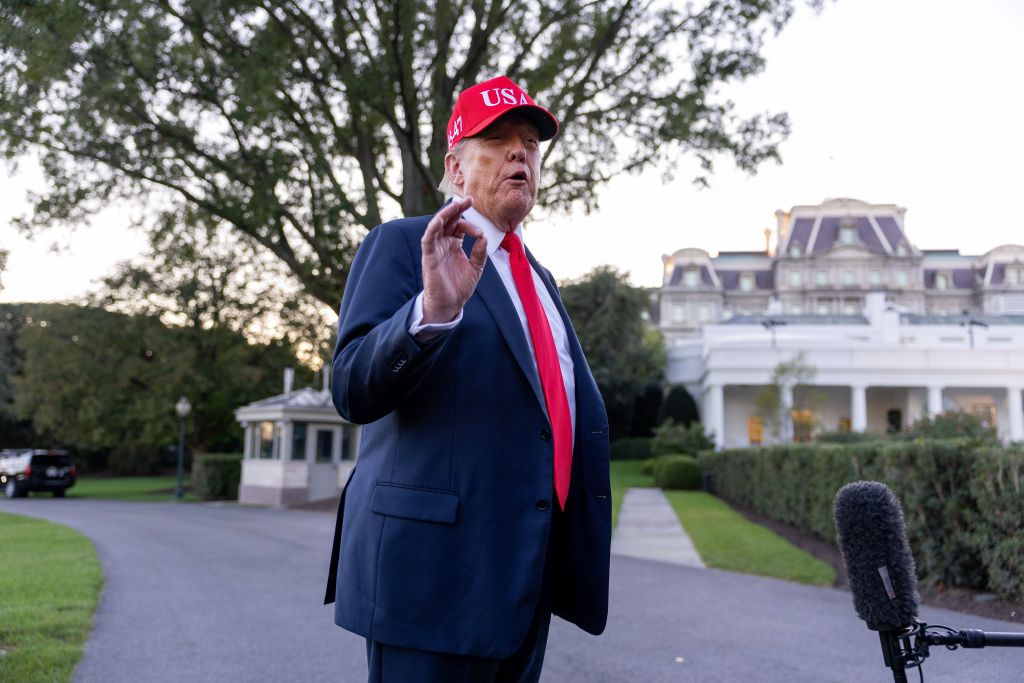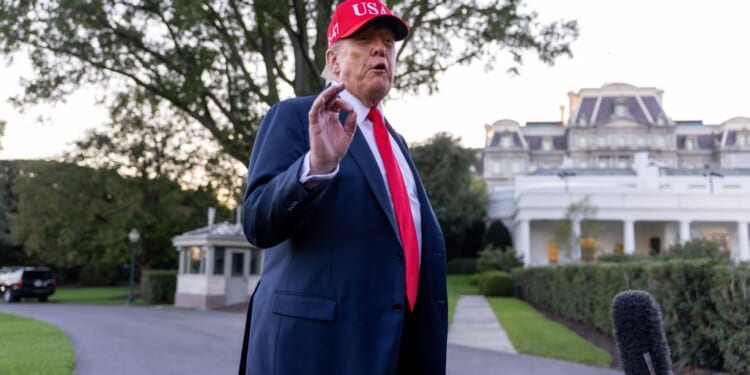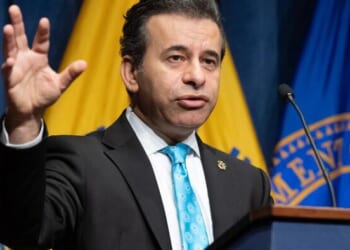
In a striking reversal from Donald Trump’s first term, Republicans are cautiously optimistic about their prospects ahead of the 2026 midterm elections. They are content with the president’s provocative unconventionality but concerned about the most normal of political concerns: the potential for a voter backlash over the economy.
Eight years ago, Republicans approached the midterm elections with dread. Trump’s unorthodox style and polarizing rhetoric shocked voters, fueling early and sustained dissatisfaction with his leadership that carried Democrats to a takeover of the House of Representatives on Election Day 2018 despite a booming economy. This time around, he’s not just communicating controversially, but governing as such: deploying military troops domestically, ignoring congressional spending directives, siccing the Justice Department on political foes, conducting mass deportations, threatening First Amendment rights—the list goes on. Yet Republicans aren’t worried.
Nine months into his second presidency, Republicans are seeing few signs of the sort of broad-based voter outrage that would suggest a blue-wave midterm backlash is building. Indeed, Republicans view Democratic chances of flipping the Senate as virtually nonexistent and are somewhat bullish about preserving their thin House majority. Only voters’ palpable economic anxiety—driven largely by persistent inflation and Trump’s aggressive tariff agenda—has Republicans concerned about the future of their congressional majorities.
“It’s a far, far cry from this point in time in 2017,” Jeff Burton, a Republican operative and former congressional aide told The Dispatch. “History is not on their side, but Republicans are very optimistic about their chances of keeping the House.”
Trump is a populist who has never conducted himself conventionally—neither as a candidate nor as a president. His language can be vulgar, and his expressed policy preferences are sometimes blatantly unconstitutional. His public musings are often conspiratorial and anchored in falsehoods, and his treatment of fellow American political leaders and foreign dignitaries can be belligerent and sophomoric. In 2018, Republicans paid the price, losing 40 House seats. In 2020, they paid again, as Democrats captured the Senate by winning two seats in Georgia.
Trump’s conduct hasn’t changed. Combined with the actions he is taking in term No. 2 and the expectation that midterm elections are naturally challenging for the party in the White House: Are Republicans worried 2026 risks replaying 2018?
To answer that question, The Dispatch this week interviewed two dozen Republican operatives, including campaign strategists, congressional aides, lobbyists, and pollsters based in Washington, D.C., and in competitive battleground states. Most GOP insiders consulted for this story requested anonymity to speak candidly, although some did not. Regardless, a remarkable consensus emerged from these conversations that might upend assumptions about how Republicans are assessing Trump’s political standing and his impact on the developing battle for control of Congress.
“I’m less worried about Trump’s actions—those are baked into the electorate’s views,” Jason Roe, a Republican campaign strategist in Michigan, told The Dispatch. “But I am very concerned about the economy.”
American voters delivered a commanding reelection victory to Trump in 2024, even after he fomented a riot at the Capitol on January 6, 2021, and took other steps to overturn now-former President Joe Biden’s 2020 victory. Voters also overlooked Trump’s two impeachments as well as the multiple criminal indictments against him during the time between his first and second presidencies. Perhaps that is why Republicans aren’t especially worried about political blowback from the myriad controversies surrounding Trump.
Trump’s resilience isn’t the only reason, however. Another is the White House political operation.
Under Chief of Staff Susie Wiles, Deputy Chief of Staff James Blair, and political director Matthew Brasseaux, Trump is running a competent, responsive, organized effort to position Republicans for success in 2026, party insiders say—at least regarding metrics they can control. For example, the president is endorsing most incumbents and discouraging primary challengers while supporting quality candidates in open-seat races. (Multiple GOP operatives noted that Trump hasn’t backed clunkers like Mehmet Oz and Herschel Walker. Both lost winnable Senate races in 2022 before taking positions in the administration.)
Trump’s external team of consultants, led by Chris LaCivita, a top adviser to the president’s 2024 campaign, also provides Republicans a measure of confidence, as do the hundreds of millions of dollars Trump-affiliated political groups are raising. According to Federal Election Commission filings, political action committees connected to Trump had amassed a combined war chest of more than $200 million as of July 1.
The ongoing campaign to redraw House districts in Texas and other red states now, rather than waiting for the next decennial census, is yet another deft—albeit politically contentious—maneuver driven by Trump that Republicans expect to benefit from. “He’s got a much better political operation this time around,” emphasized a veteran Republican strategist. This operative and many in the party were often frustrated during the president’s first term by a White House political shop they described then, and look back on now, as chaotic and ineffective.
There is one more change from eight years ago that is contributing to the Republicans’ rosy disposition about 2026: a Democratic Party plagued by infighting between pragmatists and progressives and a stubborn refusal to shift to the center on politically charged cultural issues on which the public sides with Republicans, including border security and transgender rights. In a CBS News poll fielded October 1-3, Trump garnered higher ratings than Democrats among independents, a bloc often decisive in midterm elections.
In the survey, 32 percent of independents approved of the president’s job performance; just 25 percent viewed Democrats favorably. These numbers demonstrate why Republicans planning to file for the 2026 ballot believe they can survive even if voters view them as a rubber stamp for Trump. “Democrats are so messed up right now. They have a bunch of unforced errors all over the place,” said a Republican consultant more accustomed to squaring off against a Democratic Party that is disciplined and strategic.
“When Democrats are being normal and moderate and thoughtful and common-sense, then I feel like everyone looks back to the right and is like: ‘What’s Trump doing?’” this GOP consultant added. “Even if we can’t turn it around on the economy, talking about the contrast with the liberal left is a big deal.”
Lately, that contrast includes stealing a page from the Democrats’ playbook and hammering them for instigating a government shutdown to force Trump and the Republicans to approve the extension of expiring Obamacare health insurance subsidies. It’s likely Republicans also will begin highlighting Trump’s success at negotiating a ceasefire in the war between Israel and Hamas in Gaza that has the possibility of turning into a broader, permanent peace agreement.
But amid all the reasons prompting optimism about defying midterm election history, Republicans keep returning to the same nagging concern: the economy. They have reason to worry.
Voters reelected Trump in large part because they had fond memories of his stewardship of the economy during his first term and thought he was the best candidate to end the sky-high inflation that took hold during Biden’s presidency (they viewed the economic downturn sparked by the coronavirus pandemic as an anomaly). But prices are still high, and voters don’t think Trump is delivering on his campaign promise to revive American prosperity and bring down prices—issues that voters consistently cite as their top priorities in public opinion surveys.
The CBS News poll showed that 27 percent view “economy and jobs” as their No. 1 issue; 21 percent cite “inflation.” Only 40 percent approve of Trump’s handling of the economy. Further, 60 percent view the economy as “fairly” or “very” bad, 51 percent believe Trump’s policies are making them “financially worse off,” 64 percent believe the president’s policies are pushing the cost of groceries higher, and 53 percent believe his policies are causing employers to shed jobs.
Worse for Republicans, 75 percent think Trump is insufficiently focused on reducing inflation and focusing too much on deploying military troops to American cities (52 percent), slapping tariffs on imports (60 percent), and criticizing political opponents (61 percent).
“When you’re not focused on the No. 1 issue, and you’re trying to drive another issue, that’s always problematic,” Republican pollster David Winston told The Dispatch. Painting Democrats into a corner on crime and border security, issues that advantage Republicans, is unlikely to obscure Trump’s vulnerability on the economy—should it continue deep into the 2026 campaign.
“If you’re talking about other subjects, you’re not talking about what’s most important to the electorate,” Winston explained.
But it’s not just Trump’s economic messaging that poses a problem for Republicans in the midterm elections, GOP operatives said.
Without prompting, many GOP operatives interviewed by The Dispatch were highly critical of the president’s trade agenda, saying his expansive use of tariffs has been an abject failure that ought to be abandoned. Trump’s goal is to force other countries to drop unfair trade practices while encouraging domestic and foreign manufacturers to make more of their products in the U.S. But so far his policies have yielded only fiscal uncertainty, middling economic growth, and the exacerbation of inflation.
Republicans complain that the White House doesn’t seem to have a plan to address the political challenge this is creating for the party and that Trump’s messaging is making the problem even worse. “He’s got to declare victory on trade and get back on offense on the economy. Quit the tariff sh-t,” said a GOP operative in the Sun Belt. Added a Republican lobbyist in Washington, D.C.: “The tariffs need to improve or go away.”

















